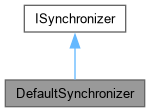This class is a default ISynchronizer implementation that actually does no synchronization and is intended for devices that don't support it. More...
#include <DefaultSynchronizer.h>

Public Member Functions | |
| virtual void | seek (std::shared_ptr< IHandle > handle, double time) |
| Sets the playback position of a handle and the synchronizer to a specific time. | |
| virtual double | getPosition (std::shared_ptr< IHandle > handle) |
| Retrieves the position of the synchronizer. | |
| virtual void | play () |
| Starts the synchronizer playback. | |
| virtual void | stop () |
| Stops the synchronizer playback. | |
| virtual void | setSyncCallback (syncFunction function, void *data) |
| Sets the callback function that is called when a synchronization event happens. | |
| virtual int | isPlaying () |
| Retrieves whether the synchronizer is playing back. | |
 Public Member Functions inherited from ISynchronizer Public Member Functions inherited from ISynchronizer | |
| virtual | ~ISynchronizer () |
| Destroys the synchronizer. | |
Additional Inherited Members | |
 Public Types inherited from ISynchronizer Public Types inherited from ISynchronizer | |
| typedef void(* | syncFunction) (void *, int, float) |
| The syncFunction is called when a synchronization event happens. | |
Detailed Description
This class is a default ISynchronizer implementation that actually does no synchronization and is intended for devices that don't support it.
Member Function Documentation
◆ getPosition()
|
virtual |
Retrieves the position of the synchronizer.
- Parameters
-
handle The handle which is synchronized.
- Returns
- The position in seconds.
Implements ISynchronizer.
◆ isPlaying()
|
virtual |
Retrieves whether the synchronizer is playing back.
- Returns
- Whether the synchronizer plays back.
Implements ISynchronizer.
◆ play()
|
virtual |
Starts the synchronizer playback.
Implements ISynchronizer.
◆ seek()
|
virtual |
Sets the playback position of a handle and the synchronizer to a specific time.
- Parameters
-
handle The handle that should be synchronized/seeked. time The absolute time to synchronize to.
Implements ISynchronizer.
◆ setSyncCallback()
|
virtual |
Sets the callback function that is called when a synchronization event happens.
- Parameters
-
function The function to be called. data User data to be passed to the callback.
Implements ISynchronizer.
◆ stop()
|
virtual |
Stops the synchronizer playback.
Implements ISynchronizer.
The documentation for this class was generated from the following file:
- devices/DefaultSynchronizer.h
Generated by